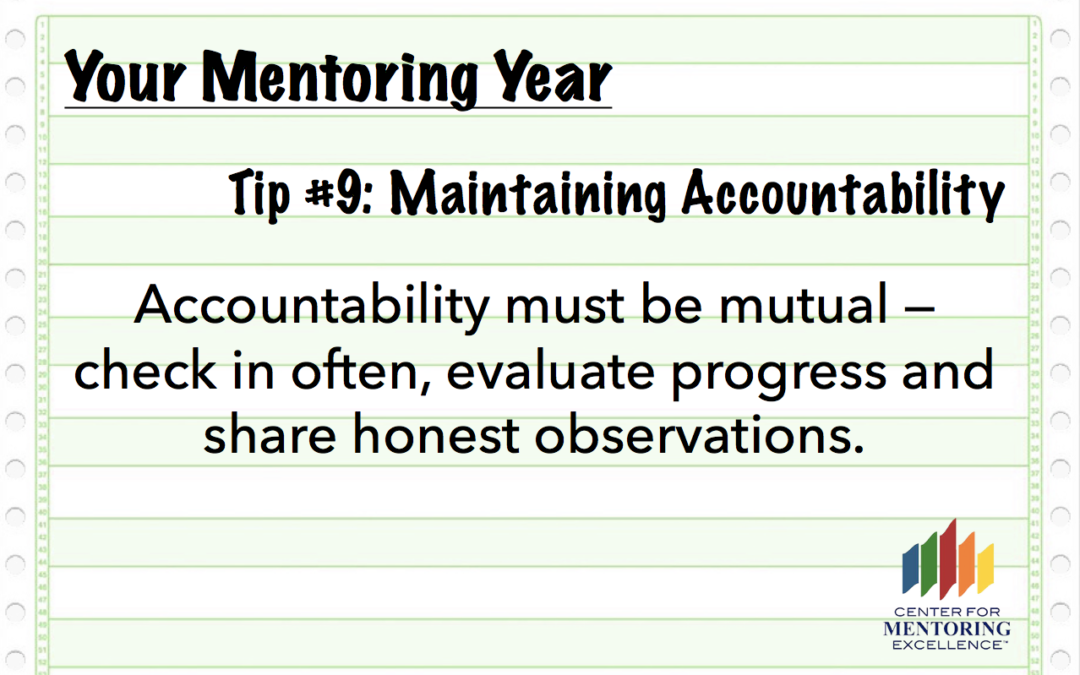
by Center for Mentoring Excellence | Dec 5, 2017 | Advice for Leaders, Facilitating Learning, Goal Setting Conversation, Growth and Development, Making Mentoring Work For You, Mentoring Communication, Mentoring Relationships, Mentoring Training, Supporting Mentors and Mentees
Maintaining accountability in a mentoring relationship is critical for success. But it’s not one-sided. Accountability must be mutual. “Wait, what?” you might be thinking. “Accountability is hard enough, but mutual accountability?”
Yes! Making sure both mentors and mentees are accountable keeps mentoring relationships moving and on track thanks to regular care and attention. Regular monitoring of your relationship guarantees that even when the relationship seems to be going well, you can still promote mutual accountability and, therefore, a healthy relationship.
How do you get started? Use the following conversation tips to provide a framework that drives mutual accountability — and helps maintain it.
-
Check in at the beginning of your meeting. Regularly ask, “How is it going?” Probe your mentee’s response, and take it to a deeper level.
-
Share your observations about how things are going and what concerns you have about the learning process. For example, “I’ve noticed that our discussions are very general and theoretical. Are you finding them helpful?”
-
Take a step back before you go forward. For example, “Let’s take a look at how we’re doing. What’s particularly helpful to you in your learning? What has been least helpful? What do you think is going well? What do we need to improve? What kind of additional assistance do you need?”
-
Use your mentee’s goals as benchmarks for measuring the progress and achievement of learning goals. Refer to them frequently. Evaluating progress regularly maintains momentum, keeps learning goals at the forefront of the relationship and holds partners mutually accountable for achieving them.

by Center for Mentoring Excellence | Mar 2, 2016 | Making Mentoring Work For You, Mentoring Relationships, Uncategorized
The idea of inserting accountability into a mentoring relationship may seem unnecessary. And yet, unless you build in a process to ensure accountability, there is always a temptation to sidestep it.
When mutual accountability becomes an ongoing expectation in a mentoring relationship it creates a shared frame of reference. It strengthens the relationship by improving communication and avoiding mentoring pitfalls. It enables partners to make midcourse corrections.
When mentoring partners engage in regular conversations about their mentoring relationship, it maintains the momentum of the relationship and contributes value to the learning of each mentoring partner.
Accountability conversations need not be cumbersome, but they should be held regularly, whether it is once a month or every quarter. If your relationship seems to be going well, checking in on its health will help ensure that you and your mentoring partner’s need are being met. At the same time, accountability conversations can assist you in gauging your progress over time and help you decide what you steps you can take to grow and improve your relationship.
We’ve developed a Mentoring Partner Check-In Accountability Tool to guide regular accountability conversations.You and your mentoring partner can complete this tool independently and then compare your responses. Or, you and your mentoring partner can complete this tool together.
You and your mentor should plan to use this tool periodically to ensure that you are staying on track. And, even if you haven’t agreed to do so initially, feel free to introduce this tool to your mentor partner at any time during your mentoring relationship. This may prove especially helpful if you suspect that your meeting time could be better utilized and you aren’t comfortable raising the issue with your mentor.
Use the Mentoring Partnership Check-In Accountability Tool throughout your relationship to make sure you stay on track and the trust level remains high.
by Center for Mentoring Excellence | Aug 10, 2012 | Uncategorized
Mentoring success doesn’t just happen. It is brought about by the conscious choice we make to engage in a continuous stream of focused and robust conversation. (more…)





